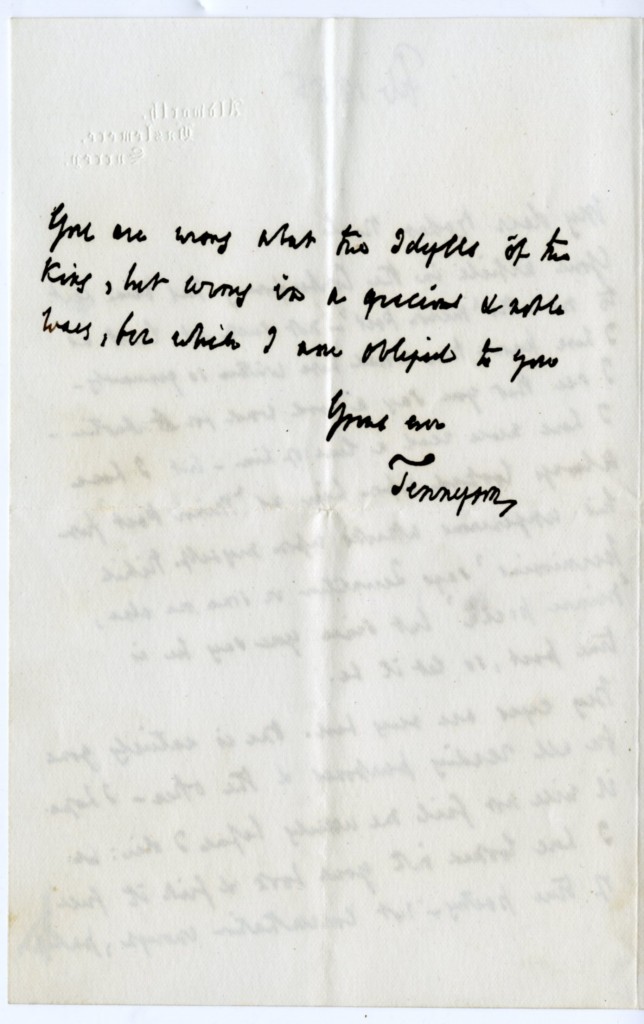Letters:
7 February 1885 Alfred Lord Tennyson to Roden Noel
13 February 1887 Alfred Lord Tennyson to Roden Noel
Rare Item Analysis: A Look at Rare Letters: How Personal Correspondences Portray Tennyson’s Public Image
by Drake Osborn
Lord Alfred Tennyson was one of the Victorian era’s most significant and well-loved poets. Glances into his character and public persona may be seen more clearly and thoroughly through the study of his personal writings and correspondences. The two rare letters studied and to be discussed here reside at Baylor University’s Armstrong Browning Library in the Victorian Letters collection. These letters provide a portrayal of how Tennyson dealt with his fame and public image and how he responded to critics, as well as a glimpse into the personal character of the poet-laureate.
Both letters are addressed to Roden Berkeley Wriothesley Noel (1834-1894). Noel was a literary critic and poet among whose main works is a large collection of poetry analyses published in 1887 by the name of Essays on Poetry and Poets. This work includes an essay on Tennyson and his poetry. The specific essay on Tennyson, however, was published earlier in February 1885 in the periodical The Contemporary Review.
The first letter to Noel is dated February 7th 1885. This letter is published in The Letters of Alfred Lord Tennyson (Clarendon Press, 1991), but until recently the original was not known to be at Baylor’s Armstrong Browning Library. This letter refers to Noel’s essay in Contemporary Review specifically, as Tennyson says he has read the review. Although the opening address of “My dear Roden Noel” can be seen as informal and affectionate, this letter appears to be a direct response to Noel’s essay. In his essay, Noel refers to himself as a “minor poet” and Tennyson as “pre-eminent”. It is clear Noel has a devout affection for Tennyson’s work, as he even says that Tennyson “must loyally be recognized as the Arthur or Lancelot of modern English Verse” (Roden 224), referring to the larger-than-life characters Tennyson himself helped to immortalize in Idylls of the King.
In this letter, another critic and poet is mentioned, Alfred Austin (1835-1913). Noel writes in favor of Austin. Austin also wrote a review of Tennyson’s work in the London magazine Temple Bar, but unlike Noel, was very harsh and critical of Tennyson. In his review, he pushes back on Tennyson’s fame and good public image as undeserved, saying that “his fame has steadily increased precisely as his genuine poetical power has steadily waned… There is yet time to recall our hasty and extravagant praises” (Austin 179, 194). Tennyson seems to have little patience for harsh critics, telling Noel in his letter that “I have never read a line of him myself but have always looked upon him as a ‘Minor Poet’ from his ungenerous remarks upon myself” and rather sarcastically tells Noel “but since you say he is a true poet, so let it be.” Although reacting harshly to Austin, Tennyson has grace in the way he reprimands Noel. Noel believed that the Idylls were too realistic to be thoroughly mythical, with too much emphasis on the free-will of the characters involved. Tennyson addresses this, saying in his letter “You are wrong about the Idylls of the King, but wrong in a gracious and noble way, for which I am obliged to you.”
The second letter to Noel is dated February 13, 1887. This letter is incredibly brief, simply congratulating Noel on his new work (which was mostly Essays on Poetry and Poets). Once again Tennyson has kind words for Noel, encouraging him in the “fight against metericalism,” a poetic movement that both men opposed. A transcription of this letter and further discussion on its contents—including an explanation of “metricalism”—can be found in a previous post: https://blogs.baylor.edu/19crs/2015/11/05/transcribed-letters-tennyson-to-roden-noel-13-feb-1887-to-sir-edwin-arnold-25-march-1891/.
Both of these letters point to the character of Tennyson. Tennyson was well known to be extremely thorough, particular, and precise. His famous poem In Memoriam took seventeen years to complete, and he is said to have edited all of his work extensively and with great detail. In the letters studied, Tennyson seems to show as much attention to the preciseness of his public image as he does to his poetry. By the time these letters were written, Tennyson was extremely well known, by all means a Victorian celebrity. These letters are important because they point to Tennyson’s desire to keep up his popular public image, to gently admonish, nurture (perhaps somewhat coddle?) and encourage those who praise him and to speak less favorably towards those who think his popularity unwarranted. It does not seem far-fetched to say that he was greatly concerned with how the public saw him. It cannot be known for sure how self-aware or image-conscious Tennyson may have been, but in these letters we see how he responds directly with critics and reviewers responsible for keeping his public image intact.
Works Cited
Austin, Alfred. “The Poetry of the Period.” Temple Bar : A London Magazine for Town and Country Readers. 26 (1869): 179-94. ProQuest. Web. 26 June 2016.
Noel, Roden. “The Poetry of Tennyson.” The Contemporary Review (1885): 202-24. ProQuest. Web. 26 June 2016.
 |
 |
 |
